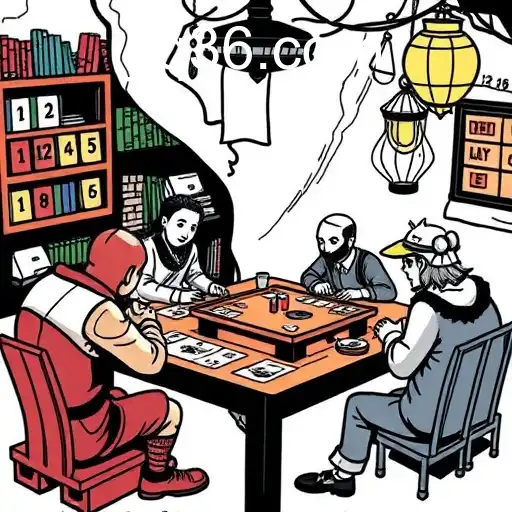
q36 - Rediscovering Tabletop Games: A Journey Through a Timeless Hobby
Exploring the resurgence of tabletop games, the unique place of 'q36' within the hobby, and the community that thrives around these games.

Rediscovering Tabletop Games: A Journey Through a Timeless Hobby
Tabletop games have enjoyed a resurgence in recent years, captivating the hearts of players young and old. These games, which encompass a wide range of experiences from intricate strategy games to simple card games, offer a unique way to connect with others face-to-face in an increasingly digital world. Among these varied experiences, the term 'q36' might not immediately ring a bell, but its significance in the realm of tabletop games is quietly growing.
The Return to Tabletop Games
The allure of tabletop games lies in their ability to bring people together. Whether gathered around a table for a heated role-playing session or enjoying a casual board game in the living room, these games offer a tangible and social experience that online gaming struggles to replicate. In recent years, there has been a noticeable revival of interest in tabletop games, as more people yearn for meaningful, face-to-face interactions.
Why the Comeback?
Several factors contribute to the resurgence of tabletop gaming. Firstly, nostalgia plays a significant role. Many adults who grew up playing classics like Monopoly, Risk, or Dungeons & Dragons are returning to these experiences now as a way to relive happy memories and share them with a new generation. Additionally, the increasing complexity and creativity within the board game community have introduced fresh and exciting games that appeal to varied tastes.
Beyond nostalgia, tabletop games offer an accessible form of entertainment. While video games often require expensive equipment and digital prowess, tabletop games typically only require the game itself, and they cater to a wide range of players, from beginners to seasoned veterans.
The Rise of 'q36' in Tabletop Gaming
The term 'q36' within the tabletop realm might appear abstract at first glance, yet it represents a growing niche. 'q36' is often associated with innovative mechanics or themes that push the boundaries of traditional tabletop experiences. These unique elements offer players new levels of depth and engagement.
Innovative Mechanics
Games categorized under the 'q36' label often feature groundbreaking mechanics that alter how players interact with the game. For instance, a q36 game might include a modular board that changes with each playthrough, providing limitless variability. This unpredictability ensures a fresh experience and challenges players to adapt their strategies accordingly.
Another example of innovative mechanics associated with 'q36' includes legacy elements, where the game evolves over multiple sessions. Decisions made in one game impact future plays, creating a cohesive storyline and adding a layer of depth unmatched by traditional board games.
Thematic Exploration
The 'q36' moniker is also attributed to games exploring unique themes. While many games traditionally stayed within the realms of fantasy, history, or commerce, 'q36' games might delve into more abstract, philosophical, or futuristic themes. These unconventional environments offer a fresh lens through which players can engage with the content, encouraging thoughtful consideration of the topics presented.
Community and Tabletop Gaming
The sense of community within tabletop gaming circles is palpable. Events such as game nights, conventions, and tournaments foster an environment where gamers can share their passion with like-minded individuals. The 'q36' concept is no exception, and its unique attributes often invite lively discussions among enthusiasts about game theory, design, and future innovations.
Tabletop conventions have become the epicenter of this communal experience. Attendees can discover new games, meet designers, and participate in panels or workshops. These conventions often feature special events for niche games like those categorized under 'q36,' further deepening the communal bonds among players.
The Impact of Social Media
Social media platforms have also played a crucial role in the resurgence and evolution of tabletop games. Online communities allow fans to connect beyond geographical boundaries, share experiences, and collaborate on projects. Platforms such as Discord, Reddit, and various tabletop gaming forums serve as vital hubs for discussion and innovation around games like those in the 'q36' sphere.
The Future of Tabletop Games
The evolution of tabletop games is an ongoing journey. With advancements in technology, there is potential for more hybrid games that blend physical and digital elements. These hybrid experiences could offer fully integrated storytelling, augmented reality components, or companion apps ensuring a seamless interface between player and game.
New methods of crowd-sourcing and funding, particularly through platforms like Kickstarter, have democratized the creation and dissemination of tabletop games. Creators can now pitch their unique ideas directly to potential players and gather support, further expanding the diversity and creativity within the tabletop realm.
The continued growth of tabletop games is a testament to their enduring appeal. In a world increasingly defined by digital interactions, the tactile, complex, and communal nature of tabletop games offers a refreshing and richly rewarding alternative. With the emergence of innovative concepts like 'q36', the future of this age-old hobby seems brighter than ever.
For those eager to explore this evolving landscape, the world of tabletop games promises endless adventures and discoveries just waiting to unfold on the tabletop. Whether you are a veteran gamer or a curious newcomer, there is a place for everyone in this vibrant and dynamic community.


GOLD VIP
Minimum deposit: ₱1,500
- ✅ 150% bonus on all deposits
- ✅ Priority withdrawal in 1 minute
- ✅ 10% cashback weekly
- ✅ VIP support 24/7
- ✅ Higher betting limits
PLATINUM VIP
Minimum deposit: ₱6,000
- ✅ 200% bonus + all Gold benefits
- ✅ Instant withdrawal 24/7
- ✅ 15% cashback weekly
- ✅ Exclusive VIP table in casino
- ✅ Special event invitations
DIAMOND VIP
Minimum deposit: ₱30,000
- ✅ 300% bonus + all previous benefits
- ✅ Dedicated personal manager
- ✅ 20% cashback weekly
- ✅ Unlimited withdrawal limits
- ✅ Exclusive trips and gifts
🚀 Register NOW and Get ₱15,000 Bonus!
⏰ LIMITED TIME OFFER! Join over 1.2 million players who have already discovered why q36 is the #1 betting platform in the Philippines. Registration in 30 seconds, first withdrawal in 2 minutes!
💬 What our players say
"Best platform I've ever used! GCash withdrawal in 2 minutes, amazing support!"
- Carlos M., Manila ⭐⭐⭐⭐⭐
"Won ₱45,000 on Gates of Olympus! They paid everything correctly via GCash."
- Ana L., Cebu ⭐⭐⭐⭐⭐
"VIP system is amazing! I have a personal manager and cashback every week."
- Roberto S., Davao ⭐⭐⭐⭐⭐
PAGCOR License
SSL 256-bit
eCOGRA
BSP Approved





